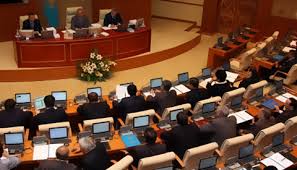 Following the formal end of national discussions in Kazakhstan on constitutional reforms intended, if only on paper, to rebalance authority away from the president toward the executive and the legislative, President Nursultan Nazarbayev has ruled the issue should be considered further in parliament.
Following the formal end of national discussions in Kazakhstan on constitutional reforms intended, if only on paper, to rebalance authority away from the president toward the executive and the legislative, President Nursultan Nazarbayev has ruled the issue should be considered further in parliament.
Speaking at a working group devoted to the reforms, Nazarbayev noted on March 1 that public feedback indicated that there were numerous shortcomings in the proposed amendments on the table.
Quashing one contentious issue from the get-go, however, the president suggested that an amendment that might notionally have opened the way for foreign nationals to buy property should be struck down. Authorities are still rattled by the wave of anti-land privatization protests that shook the country last year and are not eager to see a repeat.
The government outreach exercise to instruct the public about the details of the reforms, which consisted in a large part of members of the upper house of parliament traveling across the country and delivering talks to large halls, wrapped up on February 26, as previously advertised.
Presidential chief of staff Adilbek Dzhaksybekov said the public had submitted more than 6,000 suggestions on possible reforms to 63 out of the constitution’s 98 articles. As things stand, 23 articles of the constitution are due for revisions.
Dzhaksybekov said there has been strong demand for an enhancement in the role of the Kazakh language in public life and for English to be granted official status. Many people have also demanded a review of provisions for the death penalty — albeit in sharply divided ways. Some want capital punishment scrapped from the statute books altogether — it exists in theory for terrorism and war crimes — while others would like it applied to a broader range of offenses.
Some people would also like to see rules tightened for MPs, such as a restriction on how many times a person can be reelected to their seat, Dzhaksybekov said.
Perhaps most importantly, there is apparently clamor for direct elections of city administrators. Nazarbayev has long avoided going down this route and devolving authority to the regions, instead preferring to concentrate power in Astana.
Nazarbayev again sought to assure his listeners that these reforms will indeed end up with some of his power being transferred to other branches of government.
“In other countries, on the other hand, they are holding referendums to increase the powers of the head of state,” he said, making a sly dig at Turkey for some reason. “Over the course of 25 years, the presidential form has fulfilled its mission.”
In actual fact, the changes are by and large fairly threadbare stuff. The president will retain an ultimate say over strategic areas like defense and foreign policy. And while the designation of the head of state as a “supreme arbiter” sounds like a significant development in principle, this role may mean the president will continue to retain the final word on most areas of policy.
Nazarbayev indicated he was satisfied the people have now been sufficiently consulted and that the rest of the work lies with legislators. The president could by rights put the matter to a referendum — as was done with constitutional reforms in Kyrgyzstan in 2016 — but he has decided against it.
“I have used my constitutional right .... and considering the need and importance of this work for the country and the people, I have decided the best decision would be to do this through parliament,” he said.
For critics of the Nazarbayev regime, however, delegating such sensitive work to a rubber-stamp parliament largely composed of blindly loyal ruling party members elected in a deeply uncompetitive vote will make a mockery of the notion the constitutional reforms are being adopted in the spirit of democratization.
EurasiaNet.Org, 1.03.2017




